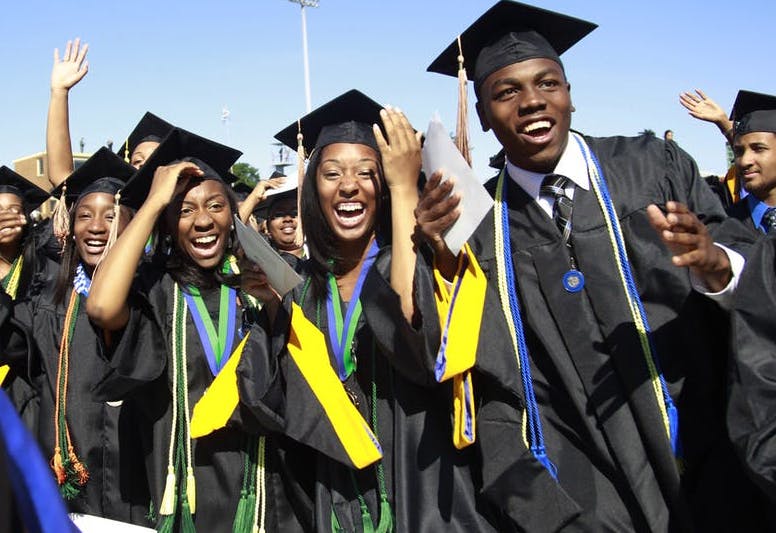…as number of citizens in US varsities hits 7-year high …13,423 Nigerian students pay N124bn per session
The number of Nigerian students seeking to acquire higher education in the United States of America has continued to increase, touching a seven-year high last year, according to the latest Open Doors report by the Washington-based Institute of International Education (IIE).
Nigerians studying in tertiary institutions in the USA rose by 5.8 percent to 13,423 in the 2018/19 academic year from 12,693 in the 2017/18 academic year, according to the report published Monday morning.
Data compiled and analysed by BusinessDay show this is the highest number of Nigerian students in the USA since the 2013 session. Nigerian students studying in the US have increased steadily from 7,316 in the 2012/2013 academic year to the current level.
The increasing number of Nigerian students in US universities is despite the fact that average tuition fee in the US for the 2018/2019 academic year was US$25,620 (N9.2 million) per year, according to a report by College Board, a US-based student support organisation.
These 13,423 Nigerian students studying in the US are paying as much as US$344 million (N124 billion) per year as tuition fees. This is besides feeding, accommodation and transportation costs.
“Most of the dollars that would have been conserved or used to import other things that we don’t have a comparative advantage in are spent on studying abroad. This puts pressure on our foreign exchange and reserves,” said Ayodele Akinwunmi, corporate banking department, FSDH Merchant Bank Limited.
Education sector analysts have attributed this steady increase in the outflow of Nigerian students seeking post-secondary education abroad to a sustained fall in the standard of education at both federal and state-owned universities, incessant strikes and decaying infrastructure in Africa’s most populous nation.
This is a vacuum private universities are struggling to fill but these universities also charge a premium for the perceived quality education they sell to students. The average cost per session for Social and Management Science courses in private Nigerian universities is about N500,000 and over N1 million for Medicine. Federal and state government-owned universities pay less than N50,000 per session in tuition, which partly accounts for the poor quality of education in these universities.
Employers of labour also tend to prefer foreign degrees for their perceived value.
“There are state universities and there are private universities. If you want to send your child to Harvard University, you will pay heavily but you also have better chances of acquiring quality education and brighter job prospects,” Tunji Oyebanji, managing director, 11 plc, said in an interview with BusinessDay.
Globally, Nigeria moved up by two places, ranking 11th position from its previous ranking of 13th among the countries with the highest number of students in America, while China, India, South Korea, Saudi Arabia and Canada are the top five countries, according to the report.
“The education sector is facing the problem of incompetent teachers and unserious students. It is also facing the problem of dilapidated infrastructure,” Peter Okebukola, former executive secretary, National Universities Commission, said.
International student mobility data is crucial to the world largest economy’s higher education professionals looking to make informed decisions as they work to internationalise their campuses. International students enrich the US universities and communities with unique perspectives and experiences that expand the horizons of American students and make US institutions more competitive in the global economy.
According to data from the US Department of Commerce, international students contributed $44.7 billion to the US economy in 2018, an increase of 5.5 percent from the previous year.
“The simple answer that I have is that people will go for value no matter the cost because they can afford it. Nigeria has many rich people who can afford American education for their children. If we fail to provide value at home, people will go out for it,” Akin Benjamin, a Lagos-based education consultant, said in a phone interview. “If you can send you child to a private university in Nigeria, chances are that you can afford education abroad as well.”
Experts in the education sector and employers of labour have suggested some solutions to help redress this trend. One proposal is to refocus the teacher education policy and ensure that “we produce what we can call ‘21-century teachers’ who are steeped in content knowledge and can deploy Information Communication Technologies effectively to deliver the curriculum”, Okebukola said. “We need to be more serious about policy implementation.”
The experts also mentioned teachers’ motivation in terms of salaries.
But in all, Nigeria needs to grow its economy so students can find work after they graduate. These analysts say it is time to look at the needs of industry and society in designing courses to be taught at the universities and not graduate with certificates that nobody needs.
Source: businessdayng




